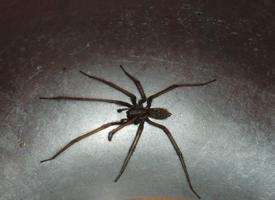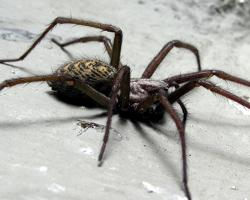
Greutăți și măsuri
| Lungime | 11 mm |
|---|
Descrierea animalului
The Barn Funnel Weaver, scientifically known as Tegenaria domestica, is a fascinating species of spider that belongs to the Agelenidae family, commonly referred to as funnel weavers due to the distinctive shape of their webs. This species, often found in human habitations or nearby outdoor areas, has a widespread distribution across the globe, particularly in regions with temperate climates.Physically, the Barn Funnel Weaver possesses a robust and elongated body, which typically measures between 7.5 to 11.5 millimeters in length for females, and slightly smaller for males, ranging from 6 to 9 millimeters. The coloration of this species varies from a brownish or grayish hue, adorned with a pattern that includes several darker stripes or marks along its cephalothorax (the combined head and thorax) and abdomen. One of the more distinctive features of the Tegenaria domestica is the presence of a herringbone or chevron-like pattern on the upper side of its abdomen, which aids in its identification.
The legs of the Barn Funnel Weaver are long and slender, with a light brown color that sometimes shows banding. These legs are adapted for speed and agility, enabling the spider to quickly capture prey that wanders into its web. Unlike orb-weaver spiders that construct circular webs, the Barn Funnel Weaver builds a sheet-like web that funnels into a narrow, tubular retreat. This funnel serves as a hiding spot for the spider, where it can wait for its prey in safety. The web is not sticky, but rather designed to entangle and trip up insects, making them easier for the spider to capture.
Barn Funnel Weavers are nocturnal hunters, relying on their web to capture a variety of insects and other small arthropods. During the day, they usually remain hidden within their funnel retreats, coming out at night to repair their webs and hunt. They have poor eyesight and rely heavily on vibrations to detect prey and potential threats.
In terms of reproduction, the female Barn Funnel Weaver lays eggs within a silk sac, which she then attaches to her web or hides in a secure location nearby. The young spiders, or spiderlings, are independent from birth and receive no care from their mother. They disperse to establish their own territories and construct their webs.
Despite their somewhat intimidating appearance, Barn Funnel Weavers are generally harmless to humans. They are not aggressive and will only bite if provoked and unable to escape. Their venom is not considered dangerous to humans, typically resulting in no more than minor discomfort or localized swelling.
In conclusion, the Barn Funnel Weaver (Tegenaria domestica) is a fascinating and beneficial arachnid, playing a crucial role in controlling insect populations. Its unique web construction and hunting techniques, along with its adaptation to human environments, make it a noteworthy species within the diverse world of spiders.
Animale similare
Fotografii noi cu animale
Top 10 animale
- Dolphin gull (Leucophaeus scoresbii)
- Diana monkey (Cercopithecus diana)
- Moustached guenon (Cercopithecus cephus)
- Galápagos tortoise (Geochelone nigra complex)
- Stone loach (Barbatula barbatula)
- Greek tortoise (Testudo graeca)
- Japanese macaque (Macaca fuscata)
- Russian tortoise (Testudo horsfieldii)
- Common flying dragon (Draco volans)
- Galápagos penguin (Spheniscus mendiculus)
